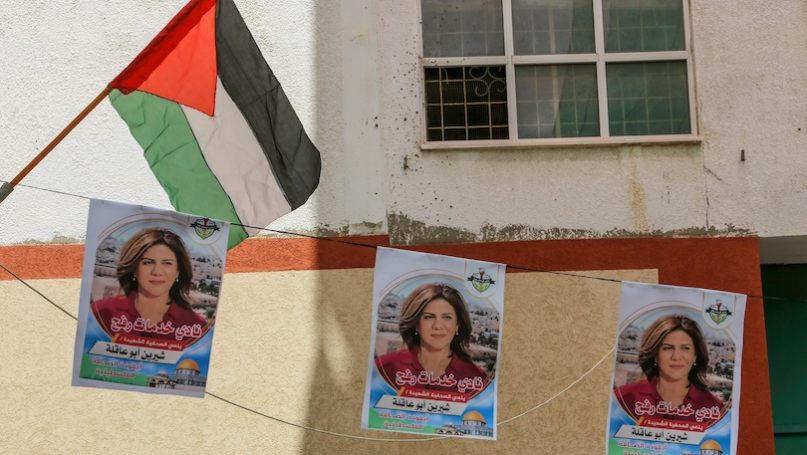
After a series of terror attacks targeting citizens in Israel, as well as military operations by the Israeli Defense Forces (IDF) in the West Bank, a new fatality shocked the world on Wednesday, May 11th, 2022: Palestinian-American journalist Shireen Abu Aqla, working for Qatar-based Al Jazeera, was killed during early morning in the outskirts of Jenin. The IDF had entered the town, after which exchanges of gunfire took place with Palestinians reacting to the operation. In situations of the like, investigations and ballistic examinations may help shed a light on what happened, but they are not always straightforward.In the Israeli-Palestinian context, this type of examinations and the establishment of responsibilities are downright complex, for different reasons.
First of all, it is important to note that, for observers from outside the Arab world, it may be difficult to grasp the importance and centrality of a figure as Shireen Abu Aqla. Across Arab countries, which in certain respects differ considerably from each other and are each confronted with their own challenges, mass media have traditionally played a particular, often unifying role. In such a context, program hosts and journalists are automatically looked up to, all the more when they cover a topic as sensitive as the Israeli-Palestinian issue. In the 21st century, moreover, contemporary media platforms have allowed Arab users to express themselves in real-time and in ways unseen before, a trend that clearly enhances public involvement and reverberates outcry.
In the immediate aftermath of the news about the journalist’s death, the autopsy in Nablus was unable to confirm the circumstances under which it had taken place, apart from the fact that there was no evidence that she had been shot at close range. While Israel called for a joint investigation into the case, the Palestinian Authority (PA) ruled out that possibility. At some point on the day of the incident, there were reports according to which the PA would send the bullet for a probe by Israel, but these were contradicted shortly after. The back-and-forth was also sustained by Israeli politicians, some of whom claimed that indiscriminate Palestinian gunfire in reaction to the IDF had hit the journalist, whereas others stressed that there were not sufficient elements available yet to draw conclusions.
While Israelis and Palestinians clearly, and not surprisingly, disagree on the steps to take following the event, the matter is further complicated by the fact that Shireen Abu Aqla also held American citizenship and that the broadcaster that employed her is based in Qatar. Several officials and media professionals from other countries and international organizations have therefore called for a completely independent investigation. The PA issued its own preliminary conclusions,according to which the journalist had been killed on purpose by the IDF, but it has since accepted, after pressure, the principle of an international probe. For the moment, however, it remains unclear when and how such an investigation could take place. Also, on a different track, Palestinian voices – including PA president Mahmoud Abbas – have demanded that the matter be examined as a possible war crime by the International Criminal Court (ICC), where an investigation into the ‘Situation in the State of Palestine’ is pending. Last April, the International Federation of Journalists already made legal submissions to the ICC concerning alleged systematic targeting of Palestinian journalists by Israel. The ICC investigation, nevertheless, is confronted with issues of its own that raise questions about its course and possible outcome.
There is an even bigger complication, however. Even if an investigation took place, the mainstream Israeli and Palestinian standpoints in the overall conflict seem light-years apart from each other, certainly after weeks of heightened tension and an increased death toll on both sides. The killing of a highly symbolic figure only fuels that antagonism, so that the outcome of any probe, even independent and international, is bound to be challenged by at least one of the parties. The current, extreme levels of mistrust between Israelis and Palestinians, both on a political level and among the population, also constitute a factor that would probably hamper any joint investigation between them. Here, mutual suspicions about each other’s intentions could hinder factual assessments, alongside predominant narratives on each side that would presumably jeopardize the acceptance of any findings.
Unfortunately, the larger picture is even bleaker. Even if results of an investigation into Shireen Abu Aqla’s death were more or less generally accepted, it is unsure whether they would bring the parties even an inch closer towards successfully tackling the conflict that has subsumed them for decades and also come at the cost of a journalist’s life, and sadly not the first. Whereas more clarity about the circumstances is perhaps the only thing the bereaved relatives and friends could still aspire to, that clarity is unlikely to bring forth by itself progress in the Israeli-Palestinian context. The tragic and eye-catching death only illustrates once again that the underlying issues are manifold, often evaded and profound.
Further Reading on E-International Relations
- Opinion – Confronting Israel’s Annexation Plans: From Fear to Hope
- Opinion – The Silencing of Amnesty International’s Report on Israeli Apartheid
- High Stakes for Palestinians: Israel as ‘the State of the Jewish People’?
- Fifty Years of Israeli Occupation
- Assessing One-State and Two-State Proposals to Solve the Israel-Palestine Conflict
- Israel: A Democratic State?